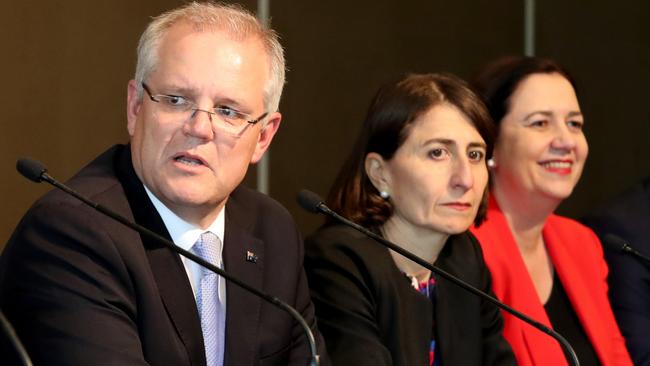Pandemic presents perfect chance to hand state powers to Commonwealth
The gulf between true political leadership and mediocrity has been exposed by the COVID-19 crisis and the report card is not pretty. It’s time for a referendum to hand greater power to the Commonwealth, writes Peter Gleeson.
Opinion
Don't miss out on the headlines from Opinion. Followed categories will be added to My News.
Australia needs a referendum to hand greater power to the Commonwealth to stop the states and territories sabotaging our post-COVID-19 recovery.
The constant stop-start-stop madness on borders – predicated on medical advice that has never been made public – is crucifying the country.
If we don’t open up the domestic aviation routes before December 1, the airline industry will simply implode. They can’t hang on any longer.
Let’s be honest. Our Federation is broke. It seemed like a good idea at the time to makes states and territories responsible for their own destiny, but they are being run by populist hicks.

Ceding power back to the Commonwealth in times of war, pandemic and for proper tax reform is now a matter of national urgency.
And while the pandemic posturing by state and territory leaders has been shameful, it’s taxation where the real mess is emerging.
The current GST carve up among the states is based on a flawed model that punishes the better performing jurisdictions and gives a free pass to those who make the loudest noise.
Take Western Australia. It received a $10bn GST boost in 2018, all because it painted a xenophobic picture that the eastern states were ganging up on it.
Now, we are seeing a debate around stamp duty and, as usual, NSW is doing the heavy lifting.
In fact, the Berejiklian Government is running rings around the rest of the country for its pandemic response and approach to economic and taxation reform.
The gulf between true political leadership and mediocrity has been exposed by the COVID-19 crisis and the report card is not pretty, particularly for Labor states.
NSW’s latest foray into reforming stamp duty legislation is another example of visionary taxation reform that will kick the other states and territories to the curb.
The benefits will not just be seen within the NSW economy but for many young people it will make the dream of home ownership real, rather than a mirage.
NSW has put out a discussion paper on the topic, flagging the prospect of a property tax being an option for buyers, to replace stamp duty.
What that means is that instead of a one off big lump sum payment when a house is purchased, the vendor has the option of an annual property tax.
That annual tax slug would vary but it might be similar to the vendor’s annual council rates bill.
Many within the NSW property industry argue that the greatest single impediment to the market is stamp duty costs, which can run into the tens of thousands of dollars. Taxation guru Ken Henry says stamp duty in Australia is the most pernicious and regressive tax of all.
First home buyers have to take into account stamp duty as part of their savings plan. It is a massive disincentive to buying a house or unit.
By freeing buyers up from the extra one off cost of stamp duty, NSW argues it will stimulate the industry, pouring billions of dollars into the economy through incentivised housing purchases.
NSW would also catch other states and territories hopping. The incentive to move to NSW to buy property rather than other states would be obvious.
Canny Queensland investors would swamp places like Byron Bay and Yamba in northern NSW if they don’t have to come up with one off stamp duty levies.
If other states were smart they’d follow NSW’s lead. But they are addicted to shortsighted monetary policy and the billions of dollars they receive in stamp duty, so don’t count on them following suit anytime soon. Queensland has already ruled it out, presumably because it’s NSW’s idea.
NSW has proven through the pandemic that it is the best performing state, containing virus outbreaks through contact tracing expertise while keeping its borders open and its businesses operational.
This is in stark contrast to the populism policies adopted by Victoria, Queensland and Western Australia.
When the postscript to 2020 and Australia’s response to the pandemic is assessed, NSW’s model will be promoted as the gold standard.
They didn’t get everything right and the Ruby Princess scandal proved that. But NSW has been able to delicately balance the health and economic impacts of its citizens, by imposing restrictions and border controls that keep them safe, but don’t send them broke.
The draconian, one-size-fits-all approach in Victoria, Queensland and Western Australia has flattened the curve, but also flattened their economies.
We can’t continue with this ad hoc, disparate governance. It is stifling growth and hurting prosperity


